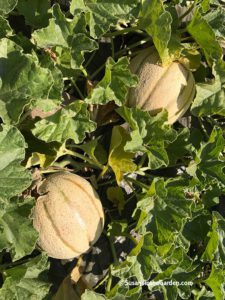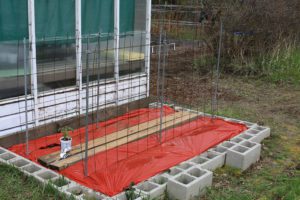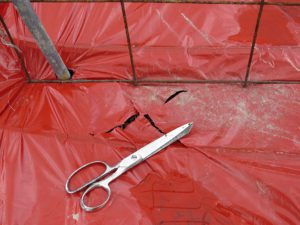Solar Mulch Report

Last year, while looking through a seed catalog, I saw a listing for something called “solar mulch.” Hmm, what’s that, I wondered?
I learned that solar mulch is a green plastic sheeting that will do two important things for a vegetable grower like myself:
- It greatly cuts down on weed growth.
- It can raise the soil temperature by as much as 10 degrees F. Wow.
If you like growing warm-season crops such as melons, cucumbers, eggplants, tomatoes and peppers, it’s important to know that they grow and produce so much better if the soil in their bed is on the warm side.
In past years, I’ve placed red plastic mulch (a.k.a. SRM or tomato mulch) on top of the beds of the above-mentioned crops. It works really well (see photo to right). But I know it doesn’t raise the soil temperature that much, plus I’m always interested in trying something new.
For my 2017 garden, I covered some beds with the red plastic mulch and three beds with the solar mulch. As a matter of fact, I had two different melon beds so — in the interests of being as scientific as possible — I covered one bed with red mulch and the other with solar mulch. I also covered one of my winter squash beds with solar mulch.
I was VERY impressed with how well the plants in the beds with solar mulch did. They were more productive than ever. Because of this, I wanted to buy more of it for this year’s garden. While comparing the prices in different seed catalogs, I came across a bargain!
Most companies sell 4′-wide by 50′-long rolls of it for about $20. But GrowOrganic.com sells the same size rolls for $9.99! You’d better believe I placed my order with them.
One thing I should clarify is how you use either type of mulch on your beds. If you have a drip irrigation system on top of your bed, you place the mulch ON TOP of it. That makes it easy for the soil to get watered. I pin down the edges of the mulch with galvanized metal pins in a few places so it doesn’t blow off the bed.
When you’re ready to plant, just cut an “x” for each planting hole, plant the seedling through that “x” and that’s it. If you don’t have a drip system on your bed, when you water the bed, the water should run through each “x” and moisten the soil. I would keep an eye on the bed for the first couple of weeks, though, just to make sure everything is getting damp enough.
As always, if you have any questions, just drop me a note at Susan@susansinthegarden.com. I’m happy to help out!



